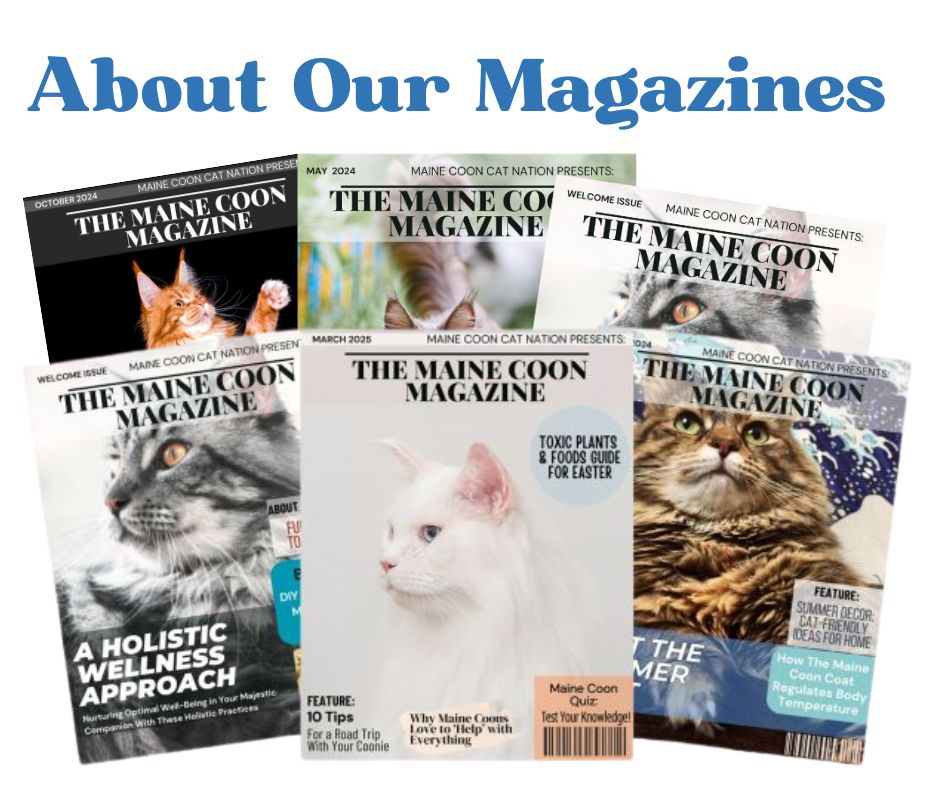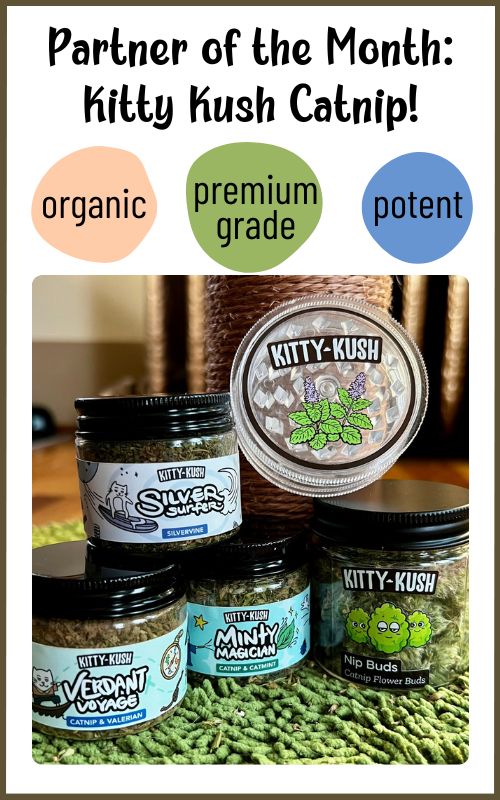- Home
- The Cat Store
- Waterless Shampoo for Cats
Waterless Shampoo for Cats
3 Top Picks & Homemade Recipe
Waterless shampoo for cats definitely has it's advantages. We've used it on our Coonies in the past, and they actually seemed to enjoy it.
Most cats loathe to take a bath, so waterless pet shampoo can provide a quick between-baths solution.
Longhaired cats like Maine Coons have a way of absorbing the smells around them.
And if they like to explore places like garages or basements (as ours do!) you've probably noticed some funky odors from time to time.
They try to groom themselves, but there is just so much fur! Giving your cat a bath from time to time certainly makes their fur soft and fluffy, but it can also be drying, and cause flaky skin. It's a good idea to space your cats baths at least six weeks apart.
What can you do in between regular baths? Use waterless cat shampoo! It's easy; just squirt it on and let it dry. Then enjoy your sweet smelling pet.
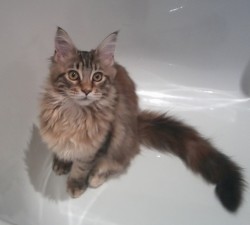 Minnie in the tub
Minnie in the tubThe Importance of Grooming for Health and Well-Being
Proper cat grooming is essential for maintaining the health and well-being of our furry friends, especially elderly cats.
As they age, they may struggle with grooming themselves, leading to matting and tangles in their fur. Regular grooming helps prevent these issues, keeping cat's skin comfortable and free from discomfort caused by excess fur.
Additionally, grooming promotes a healthy coat and skin by removing dirt, debris, and loose fur, preventing potential skin infections.
Beyond physical benefits, grooming sessions also serve as an opportunity for owners to check for any lumps, bumps, or abnormalities that may require veterinary attention.
In essence, grooming is a crucial aspect of caring a feline friend, contributing to their overall quality of life.
Choosing The Right Waterless Shampoo for Cats
It's a good idea to look for products with natural ingredients, such as oat extracts and gentle coconut, to ensure a mild and nourishing formula suitable for various coat types.
These ingredients are not only gentle on your sensitive skin but also provide moisture, promoting a healthy and lustrous coat.
Look for a rinse-free formula, as this eliminates the need for water, for a stress-free application.
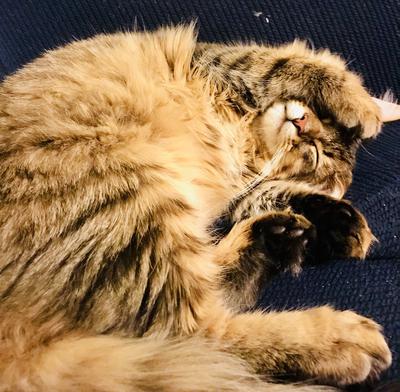 Lancelot, looking cozy
Lancelot, looking cozyAdditionally, consider dry cat shampoos enriched with vitamin E. This essential nutrient contributes to skin health and can soothe any potential irritations.
Vitamin E also aids in maintaining a soft and shiny coat, adding an extra layer of care to the grooming routine.
Be cautious of products with harsh chemicals or artificial fragrances, as these may cause skin reactions, particularly in sensitive cats.
Reading product labels and customer reviews can help you make an informed decision. Select a waterless shampoo for cats that aligns with your kitty's specific needs, such as those formulated for long-haired or elderly cats.
Some products cater to specific skin conditions or sensitivities, providing targeted care for your feline friend.
Ultimately, the right no rinse formula should not only cleanse effectively but also contribute to the overall health and well-being of your pet.
By choosing natural ingredients, a rinse-free foam application, and beneficial additives like vitamin E, you can ensure a positive grooming experience for your feline companion.
Homemade Waterless Cat Shampoo
DIY waterless cat shampoos provide flexibility, allowing owners to tailor formulations based on their cat's specific needs or sensitivities.
Homemade solutions offer an affordable and eco-friendly approach to keeping your cat clean and comfortable between traditional grooming sessions.
Simple Homemade Recipe:
Ingredients:
- 1 cup of cornstarch or arrowroot powder
- 1 tablespoon of baking soda
Instructions:
- In a mixing bowl, combine the cornstarch or arrowroot powder with the baking soda.
- Mix the ingredients thoroughly to create a well-blended powder.
Application:
- Use a brush to remove loose fur and debris from your cat's coat.
- Sprinkle a small amount of the powder onto your hands or directly onto your cat's fur.
- Gently massage the powder into your cat's coat, focusing on areas that may be greasy or have an odor.
- Allow the powder to sit for a few minutes to absorb oils and odors.
- Use a clean, dry cloth or soft towel to brush and wipe away the powder, along with any loosened dirt or fur.
Always monitor your cat for any signs of discomfort or skin irritation, and discontinue use if any adverse reactions occur.
This DIY method is a quick and budget-friendly solution for keeping your furry friend fresh between regular baths.
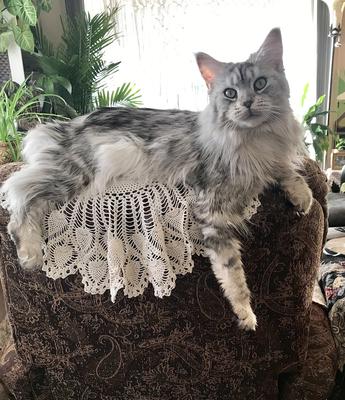 Isabella, sitting pretty
Isabella, sitting prettyYou may notice that many online homemade recipes contain essential oil ingredients such as chamomile or lavender essential oil.
We do not recommend the use of essential oils to anyone who isn't experienced in their use. Essential oils are extremely potent and must be diluted.
You will get a variety of different information regarding whether they are safe on felines, and if so, how much to use. It's best to avoid them.
If you like the scent of lavender, chamomile or coconut, purchase a safe and effective scented waterless dry shampoo:
3 Top Picks:
Disclosure: this site is reader-supported. When you buy through links on our site, we may earn a small commission, at no extra cost to you.
Vet's Best Waterless Cat Bath
This waterless shampoo boasts natural plant-based ingredients, such as Aloe Vera, Neem Oil, Vitamin E, and Oatmeal to gently clean, condition, and moisturize for a happy and clean cat.
Burt's Bees for Pets Cat Natural Waterless Shampoo with Apple and Honey
This nourishing shampoo is made with 99.7% natural ingredients. It's veterinarian recommended and free of fragrances, sulfates, colorants, and harsh chemicals.
Wahl USA Cat Refresh Cleaning Wipes with Oatmeal Formula
For a quick touch-up, cleaning wipes are a good option. These popular wipes are alcohol-free, no mess, and perfect for quick clean-ups or impatient felines. They have a soothing oatmeal formula and a fresh coconut lime scent.
Frequently Asked Questions:
Is waterless shampoo safe for all cat breeds? They are generally safe for all breeds, but it's crucial to consider your pet's specific needs.
Cats with certain skin conditions or sensitivities may require special formulations. Always check the product labels and consult with your veterinarian if you have concerns about compatibility.
How often should I use no rinse cat shampoo? The frequency of use depends on your individual needs and lifestyle. For most kitties, using waterless shampoo once a month or as needed is sufficient.
However, elderly cats or those with mobility issues may benefit from more frequent use. Always observe your cat's reaction and consult with your vet for personalized advice.
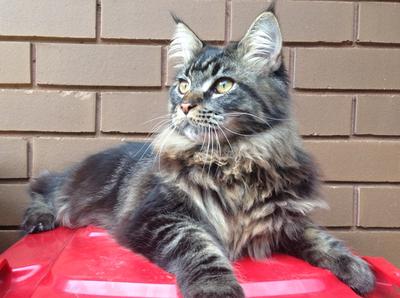
Can I use homemade waterless cat shampoo on my pet? Homemade versions can be effective, provided you use safe ingredients and follow a vet-approved recipe.
Be cautious with essential oils, as some may be harmful to cats. Always test a small amount on a patch of your cat's hair to check for adverse reaction and consult your veterinarian if you have any doubts.
How do I apply it without causing stress to my cat? To minimize stress, introduce the product gradually. Begin with short sessions and use positive reinforcement.
Offer treats and gentle praise to create a positive association with the grooming process. Always be patient and stop if your cat shows signs of discomfort.
Can waterless cat shampoo replace traditional bathing entirely? While waterless options are convenient between baths, they don't replace traditional bathing entirely.
A regular "spa day" with water is still necessary for a thorough clean, especially for long-haired breeds.
Waterless shampoo for cats is ideal for touch-ups, spot cleaning, or when a deep cleaning full bath is impractical.
Top of Waterless Shampoo for Cats
Recent Articles
-
Today's Features
Apr 16, 25 09:54 PM
Today we have two classic Memory Lane pages to share!
Murphy & Candy Cane: Double the Maine Coon Charm - This adorable Maine Coon duo from our 2011 Photo Albums - Murphy and Candy Cane - brought doubl… -
Memory Lane Month Begins!
Apr 15, 25 10:22 PM
We're thrilled to start our "Memory Lane Month" event by visiting some cherished moments from our community! We're in the process of restoring meaningful community stories like this one, to preserve t… -
Will a Maine Coon Protect Its Owner From Danger or an Intruder?
Apr 09, 25 10:41 PM
Plenty of people are curious: Will a Maine Coon protect its owner if something happens? Let’s talk about what this means, and what kind of protector a Coonie is.
